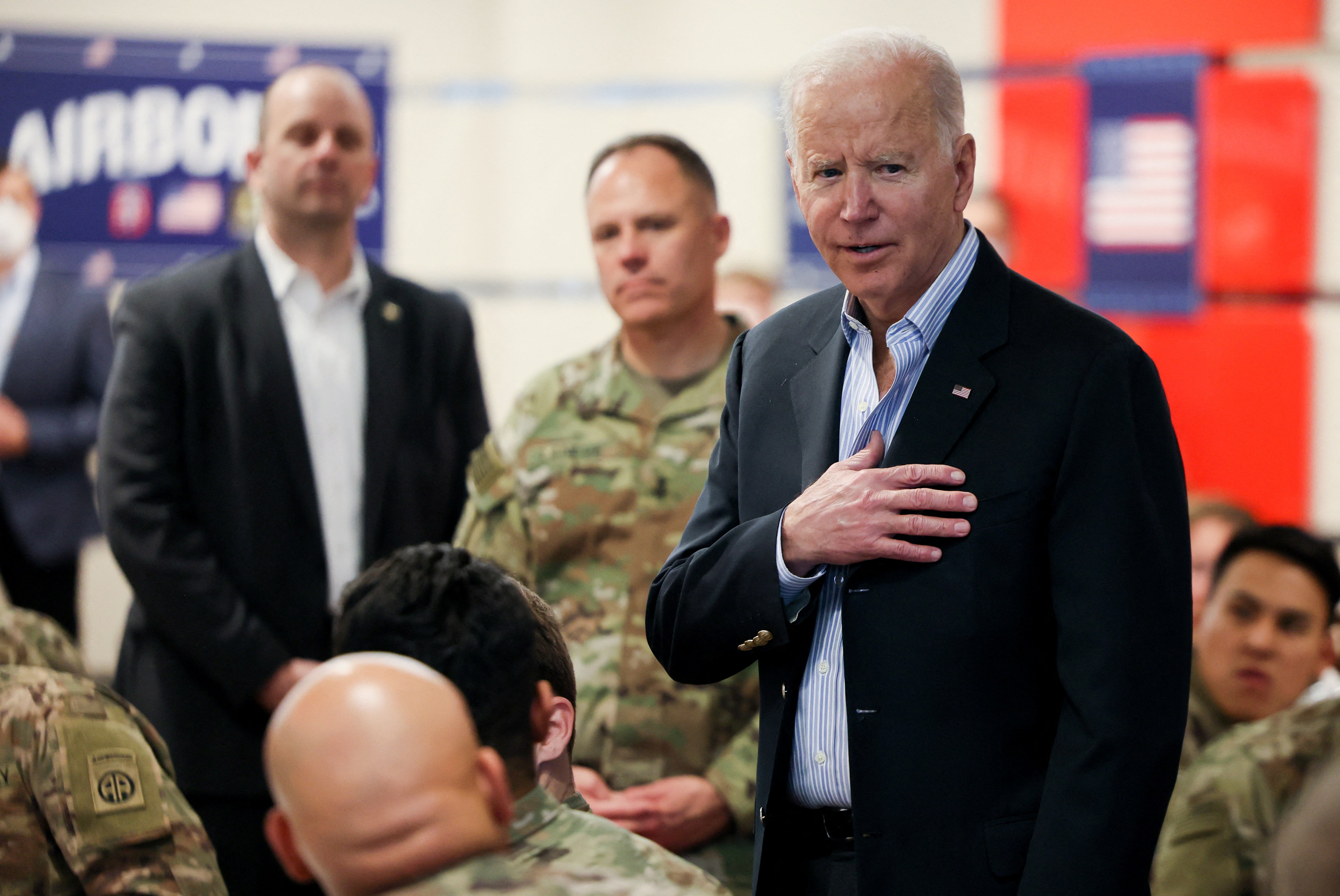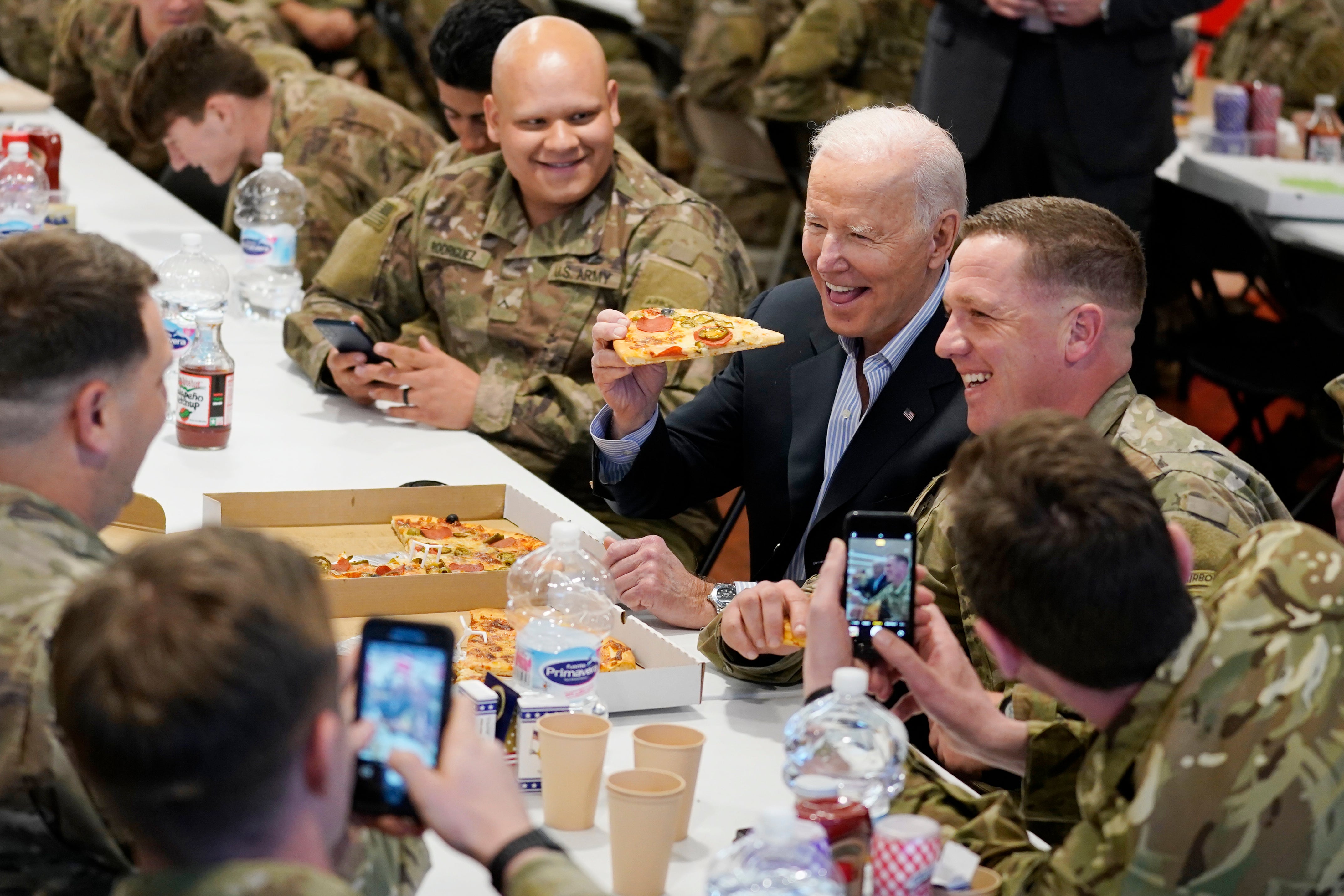Biden says he was told he wasn’t allowed to go to Ukraine as he praises ‘backbone’ of Ukrainian people
‘This is Tiananmen Square squared’
Your support helps us to tell the story
From reproductive rights to climate change to Big Tech, The Independent is on the ground when the story is developing. Whether it's investigating the financials of Elon Musk's pro-Trump PAC or producing our latest documentary, 'The A Word', which shines a light on the American women fighting for reproductive rights, we know how important it is to parse out the facts from the messaging.
At such a critical moment in US history, we need reporters on the ground. Your donation allows us to keep sending journalists to speak to both sides of the story.
The Independent is trusted by Americans across the entire political spectrum. And unlike many other quality news outlets, we choose not to lock Americans out of our reporting and analysis with paywalls. We believe quality journalism should be available to everyone, paid for by those who can afford it.
Your support makes all the difference.US President Joe Biden on Friday said his advisers have told him he could not visit the Poland-Ukraine border because of security concerns, as he hailed the courage of Ukrainians – soldiers and ordinary citizens alike – who’ve taken up arms to defend against the now month-long unprovoked Russian invasion of their country.
Speaking at a briefing on the humanitarian crisis brought about by Russia’s aggression alongside Polish president Andrzej Duda, Mr Biden compared the Ukrainian people’s defence of their country to the students who stood up to China’s communist government during pro-democracy protests in the late 1980s, and hailed the “courage, passion, resilience” of Ukraine’s people.
“When you see a 30-year-old woman standing there in front of a tank with a rifle. I mean, talk about what happened to Tiananmen Square, this is Tiananmen Square squared,” he said.
Mr Biden, who arrived in Poland after meeting with European Commission president Ursula von der Leyen in Brussels and announcing a new US-European task force on energy security, said he was there “to see firsthand” the humanitarian crisis, and lamented how he was not being allowed to visit the border.
“Quite frankly, part of my disappointment is that I can't see it firsthand like I have in other places,” he said, adding that he understood why he was being advised against going.
Earlier on Friday, the president visited with members of the US Army’s 82nd Airborne Division at their temporary headquarters in Jasionka, Poland, where they’ve been deployed as part of a Nato effort to reinforce the alliance’s eastern flank as a deterrent against Russia.
Speaking to a large group of soldiers at the G2A Arena, Mr Biden praised the Ukrainian people as having “a lot of backbone” and “a lot of guts”.
He told the troops he was not confining his assessment of Ukrainian fortitude to the regular forces who’ve been fighting Russian troops since they invaded last month.
“I don’t mean just the military, which we’ve been training since back when Russia moved in ... southeast Ukraine. But also the average citizen. Look at how they’re stepping up. Look at how they’re stepping up,” he said.
“You’re going to see when you’re there, you’re going to see — women, young people standing ... in the front of a damn tank saying ‘I’m not leaving’ — they’re incredible”.
While Mr Biden’s remarks implied the possibility that US troops may cross the border into Ukraine, a White House spokesperson told The Independent Mr Biden was not signaling a change in US policy.

“The President has been clear we are not sending US troops to Ukraine and there is no change in that position,” they said.
But the possibility that Russian president Vladimir Putin – whom Mr Biden condemned as a “war criminal” during his joint appearance with Mr Duda – might escalate the conflict he started by employing banned chemical weapons could force the hands of Mr Biden and Nato leaders.
Although Russia is a signatory to the Chemical Weapons Convention, Mr Putin has shown no qualms about using such weapons, either through proxies such as Syrian dictator Bashar Al-Assad (who used Sarin nerve gas in a 2017 attack in Khan Sheikhoun) or though his own forces, including on foreign soil.
Asked during a press conference on Thursday if a decision by Mr Putin to attack Ukraine with chemical weapons would force Nato to take military action, Mr Biden told reporters Nato leaders would decide how to respond if and when Russia chooses to deploy such weapons, and said the use of chemical weapons by Russia “would trigger a response in kind”.
At the same press conference, the president also said he warned Chinese leader Xi Jinping against taking any action to help Russia weather the economic storm brought on by sanctions imposed as a result of Mr Putin’s decision to invade Ukraine.

Mr Biden did not answer directly was asked if he’d seen any indication that Mr Xi has made a decision on whether to assist Mr Putin.
But the president referred back to the two-hour conversation he had with Mr Xi on 18 March, during which he said he “made sure” the Chinese leader “understood the consequences of him helping Russia”.
Referencing “long discussions” he said he’d had with Mr Xi about China’s ambitions for “economic relations” and “economic growth” with the West, Mr Biden said he warned Mr Xi that a decision to assist Moscow would put r“himself” and “those aims” in “significant jeopardy”.
“I think that China understands that its economic future is much more closely tied to the west than it is to Russia,” Mr Biden said. “And so I'm hopeful that he does not get engaged”.

Join our commenting forum
Join thought-provoking conversations, follow other Independent readers and see their replies
Comments